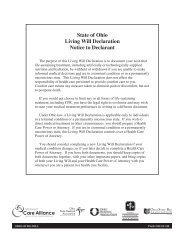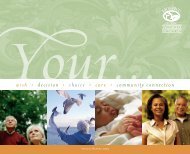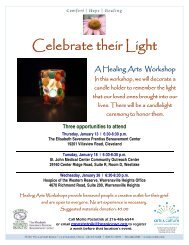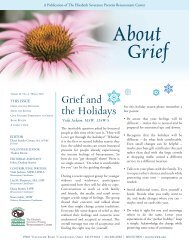Seven Choices: Finding Daylight After Loss Shatters Your World
Seven Choices: Finding Daylight After Loss Shatters Your World
Seven Choices: Finding Daylight After Loss Shatters Your World
Create successful ePaper yourself
Turn your PDF publications into a flip-book with our unique Google optimized e-Paper software.
2<br />
Misguided “Ground Rules” of Grief<br />
By Laurie Mason, MSSA, LISW-S<br />
The death of someone close can lead us to expect and often<br />
receive wonderful support from the people in our lives.<br />
Sometimes however, grieving people discover that society has<br />
established “ground rules” that are not helpful in their grief<br />
journey. Some of these misguided notions include:<br />
Life should return to normal shortly after the funeral<br />
Grieving people often receive great support just after the<br />
loss, during the funeral and the days immediately following.<br />
However, friends return to their lives and may expect that the<br />
grieving person should as well. In reality, the first weeks after<br />
the death of a loved one are just the start of the grief journey.<br />
You must get rid of belongings immediately<br />
Well meaning family and friends may try to “help” by quickly<br />
going through the deceased’s belongings and packing them<br />
up to be discarded, feeling these will only add to the grief.<br />
In reality, many belongings of a loved one can bring great<br />
comfort to the one who is grieving.<br />
Men should not cry but women must<br />
Society often places restrictions on the way a person should<br />
grieve. Men are taught not to cry and to be strong. Therefore<br />
a man who openly weeps may be perceived as “weak.” Women<br />
who do not show tears may be seen as “cold.” In reality, there<br />
is no right or wrong way to grieve, regardless of gender. How<br />
you express your grief is as personal as the loss itself.<br />
The grief of a parent whose child has died trumps your grief<br />
Society often places hierarchical value on different types of<br />
loss. The loss of a pet may be seen as less meaningful than<br />
that of a sister. The death of a distant grandparent may<br />
be perceived as less important than that of a close friend.<br />
Consequently, many grievers are disenfranchised because<br />
society doesn’t recognize their loss as significant. In<br />
reality, every loss is significant and every person has a<br />
right to grieve.<br />
Widows/Widowers must give up their couple friends<br />
because they feel uncomfortable around you<br />
Sometimes a death can be a harsh reminder of your own<br />
mortality. Because of this, couple friends may consciously or<br />
unconsciously avoid the surviving spouse of a friend who has<br />
died. This can be very hurtful to the grieving person who<br />
needs their support now more than ever.<br />
You have exactly one year to get over this<br />
A person’s grief is as individual as his or her loss. There is no<br />
magic in reaching the milestone of one year. However, society<br />
seems to place great stock in the notion that “it’s been a year<br />
so you should be feeling better.” In reality, it may be just the<br />
beginning of the grief journey for some people. The nature<br />
of grief lies in the nature of the relationship one had with the<br />
person who died.<br />
The journey of grief is personal and can’t be directed by<br />
what others say. If you are grieving, know that it is ok for<br />
you to feel how you feel, regardless of the “ground rules” put<br />
in place by society. If you are supporting someone who is<br />
grieving, let them know that you want to help in ways that<br />
are most useful to them. If you don’t know how, ask. It is<br />
also wise to offer help in a way that is comfortable for you.<br />
Recognize your own limitations. Don’t promise things you<br />
cannot deliver. It is difficult to lose someone we love. Start<br />
by just being present and available. This may be the best<br />
gift you have to offer.<br />
The Vista Walk<br />
remember your loved one<br />
The Vista Walk is Hospice of the Western Reserve’s memorial<br />
garden brick pathway located on the shores of Lake Erie at Hospice<br />
House. Anyone who wishes to remember their loved one by<br />
purchasing a brick with a special inscription is invited to call (216)<br />
383-3712 for more information. The Vista Walk at Hospice House<br />
is open for meditation and reflection.<br />
289132_AboutGrief.indd 2 10/29/09 11:57 AM
















